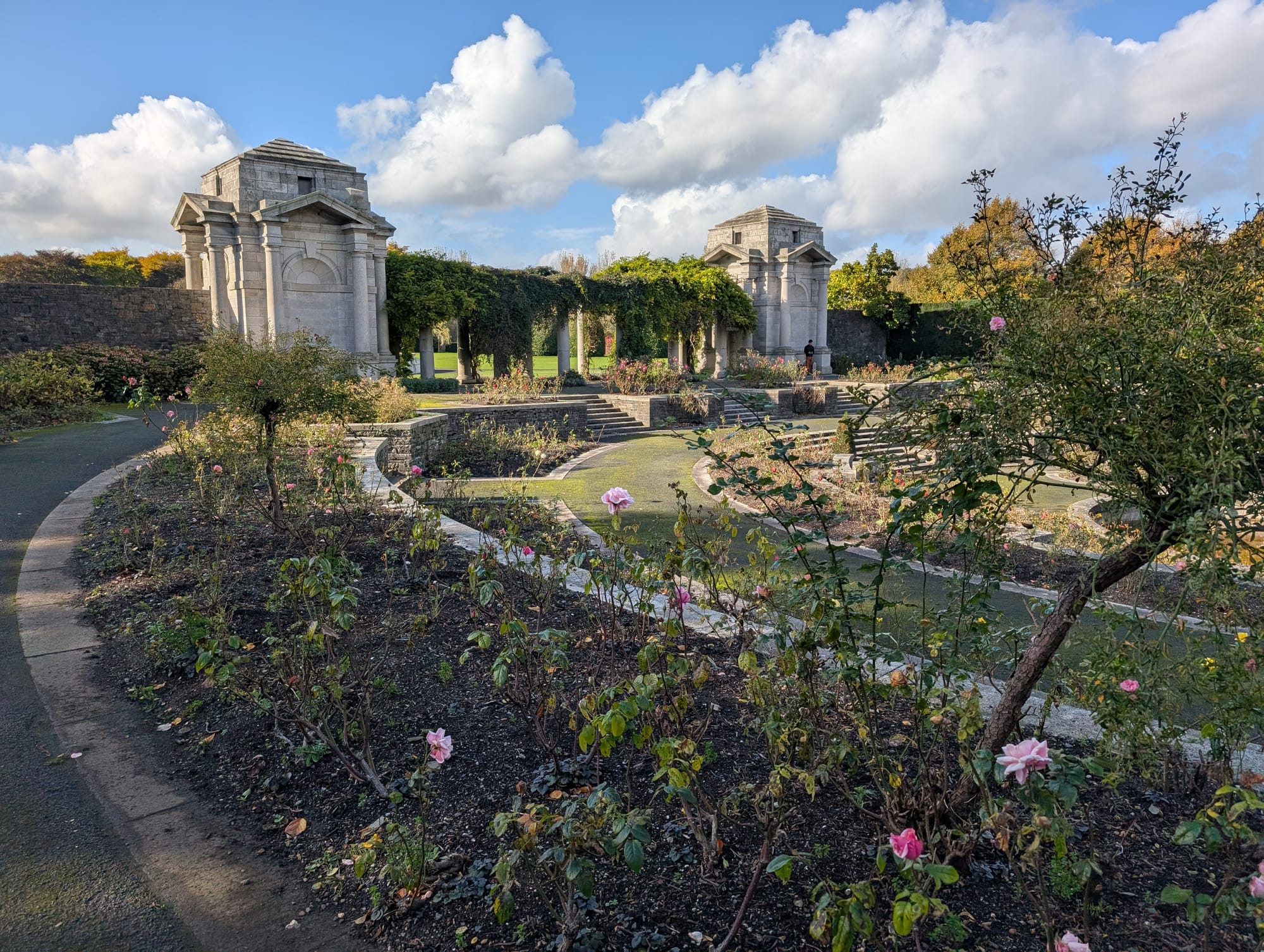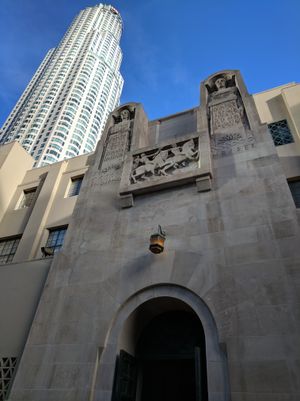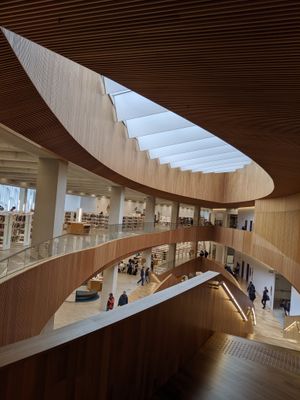Pluralized memories
Memory, as we know, is complicated, and I sometimes hesitate before using the term. The complications are certainly alive in this Decade of Centenaries period in Ireland. One is often reminded of how alternative and contested memories have been common across Irish diasporas and histories.
Growing up in Dublin, one of my favorite places was the elegant War Memorial Gardens in Kilmainham. Designed by Lutyens, the architect of Empire, they combine monumental grandeur with a sense of proportion and calm, leading down to the river Liffey. They commemorate the Irish dead in the First World War. In another time and place, these gardens would have been seen as a national treasure, a gracious contribution to the public commemorative record. However, they were marked by sad and long neglect. In part, they might have seemed overly grand. Also, commemorating those who died in a British uniform didn’t fit well into the political narrative of the Irish state post independence.
Some relevant context for this attitude is provided by Irish philosopher Richard Kearney (based at that diaspora center of Irish Studies, Boston College) as he discusses Irish centenary celebrations in 2016:
A YEAR of double remembrance for the Irish, 2016 marks the centenary of Ireland’s Easter Rising against Britain, when almost 500 Irish citizens died, and it commemorates the Battle of the Somme in Flanders, in which 3,500 Irish expired in a single day fighting in British uniform against Germany.
He describes the tension between these double remembrances:
Why? Because Official History after 1916 decreed you could not be Irish and British at once. A binary logic of either/or trumped a dialectical one of both/and. The complex muddle of events was replaced by Grand Narratives of opposed nations. ...
... This is why commemorating 1916 is a drama. The options are decisive. Either one repeats the divisive narratives of militarist history (British versus Irish, Loyalist versus Nationalist, North versus South), or one complicates and pluralizes memory by retrieving stories of “crossed identity” — for example, tales of siblings, neighbors, friends, and lovers, who found themselves on opposite sides at that historic moment.
And what about those tales of siblings, neighbors, friends and lovers? The Archives of RTÉ (the Irish national public broadcaster) provide an interesting lesson. This organization does an admirable job in outreach and amplification. This is from the introduction by Myles Dungan to their exhibition on World War 1:
In some respects this collection of RTÉ archive material is a microcosm of that Irish psyche. ... Its archive reflects Irish preoccupations. Its omissions point towards our blind spots. On the debit side is the fact that, as a repository of oral history the RTÉ catalogue includes barely thirty first-hand Irish witnesses of the First World War. On the merit side is the fact that it includes all of thirty first-hand witnesses of the Great War in a time of calculated and culpable amnesia.
A ‘calculated and culpable amnesia’ is an interesting and strong phrase, introduced here to place the actions of the archive in the context of an overall political/cultural trend which wanted to emphasise the ‘Irishness’ of an independent Ireland. But ‘Irishness’ was often defined negatively in relation to ‘Englishness’ or 'Britishness', with implications for what becomes part of the historical or commemorative record.
Linking these two texts, there is a contrast then between at least two conceptions of memory. First, there is an 'Official History' which entails a 'Grand Narrative' which in turn requires a calculated and culpable amnesia, a selective remembering and forgetting in the archive. Or, in the example above, the neglect of a monument to the Irish dead in the First World War. Second, there is a complicated and pluralized memory, a fuller record of mixed identities and experience based on stories which have to be retrieved. But such a pluralized memory often depends upon the archive or library or museum which intervenes to save and keep those memories.
The centenary celebrations underlined how attitudes around this double remembrance had changed, as the country embraced the memory of those dead in the Great War.
Memory was also pluralised in another way. There was an active recovery of the memories, experiences and contributions of women to the Easter Rising, hitherto poorly represented in historic and commemorative work. And interestingly, "what we know of women’s participation in the Rising has been transformed by the material released from the Military Archives over the past decade."
Such a pluralized memory is an example of "endangered knowledge," a compelling phrase used by the guest editors of a special issue of the new journal Kula. They write:
We present here theoretical and practical considerations of questions relating to archival salvage and erasure, the persistence of the public record, indigenous knowledge, and the politics of loss. Although imperfect and blunt, our term ‘endangered knowledge’ is meant to conjure a larger set of emerging ideas that cross disciplinary, practical, and professional boundaries. ....
In soliciting contributions, we sought to explore endangerment as a critical category of analysis for records, data, collections, languages, ecosystems, and networks—and to consider the cultural and existential stakes of the dissemination and preservation of material at risk of disappearing, whether that risk stems from inherent ephemerality, environmental loss, a lack of proper preservation measures and care, or acts of deliberate erasure.
"Acts of deliberate erasure" reminded me of "calculated and culpable amnesia." The contributions to the special issue talk of the variety of ways in which the memories or knowledge of communities may be endangered. These include those that arise from the always already interpreted nature of collecting, where materials may not align with an official or accepted narrative, where descriptive or organizing practices assimilate materials to the collector's perspective, or where the experiences and memories of particular communities may be overlooked or shunned.

Memory institutions redux
I am sometimes credited with introducing the phrase 'memory institution' in a library context, although other earlier uses have been noted. This was in the context of a working group and report of the European Commission which looked at shared interests across libraries, archives and museums. In this group, it was a necessary step as we found ourselves stumbling repeatedly over vocabulary.
I think 'memory institution' is a useful shorthand, a necessarily reductive convenience which allows conciseness in discussion across these domains.
However, I do not think we should lean too heavily on it for various reasons. The three domains have different orientations and curatorial traditions, and have important roles that may or may not be encompassed by the term. And certainly, there is a very sophisticated and nuanced literature and legacy of discussion about the relations between experience, memory, representation, history, authority and institutions. Perhaps more so in the archival community, given the closeness between the archive, history and government, than in libraries. Concepts such as memory work and imagined communities have made us more aware of the complex interplay between mediation, experience, power, community identity and the memory institution.
The 1916 example above highlights some general issues that arise as we think about how memory institutions support cultural identity and memory.
- Authority. We now recognize that collecting reflects dominant or received structures - differently of course in difference contexts, and more or less explicitly. Experiences of the Great War were elided in the archive because they were elided in the ideology of the Irish Free State. Other authority structures may be in play, around attitudes, discipline, belief, gender, politics, ....
- Recognition. Social or collective identity is important for individual identity formation, and it is important for people to recognize those collective identities in cultural and educational institutions.
- Fugitive. The environment of knowledge production and sharing has changed. Of course, not all experience or memory is committed to fixed texts, and oral or visual materials may be important. But in print cultures also, pamphlets, posters, video may not have been collected. This has become a major issue in a digital environment given the importance of the web and social media, and of major changes in how materials are created, distributed and consumed. Think of how news has moved from relative static programming or newspapers to complex databases which will have a variety of manifestations, and to a multitude of web and video services. Think of how we create and experience music, video and movies. This extends and complicates the role of memory institutions. For example, the National Library of Ireland issued a call to the public to nominate websites which they believe "best remembered the events of 1916" and should be archived. It also greatly diversifies the range of institutions with an interest in cultural (or scholarly) memory and experience. The role of community archives is notable. The Documenting the Now project provides a fascinating exploration of issues involved in capturing social media around the Ferguson protests, including a discussion of the application of archival principles.
- Context. Materials may be assimilated to the context of the collecting institution, ignoring or ignorant of how meaning is generated in their originating environment or of cultural protocols which are important for how they are described, organized or shared. This a general issue, but has become of keen interest in relation to a heightened awareness about indigenous knowledge.
So, while acknowledging its convenience as a term, these factors prompt me to have two hesitations about 'memory institution.'
The first is major and I can only gesture towards it here. The political and commercial forces which have made fact and news problematical, the scale of social media and other network communication in a 'post-scarcity' world, and the social diversification of curatorial interests further complicate our sense of collective memory and of its guardianship. New network level organizations have emerged (e.g. Internet Archive, Wikipedia). The scope of existing memory institutions will evolve in this complex environment in which a diffuse pattern of institutions is stepping up to a memory role. The focus on the border between Northern Ireland and the Republic in Brexit discussion has highlighted the evolving complexities of identity (British, English, Northern Irish, Irish, European) and contested memories. How will the multiple voices and contexts be recorded?
The second is that it suggests a passivity, an unproblematic filling of receptacles with memory. But this is far from the case. Thinking about institutions which resist 'culpable amnesia' and which 'pluralize memories' is to acknowledge their very active recognition and recovery of experiences, memories and the texts which convey them.
I turn to an example from a more recent period in Irish history. The Linen Hall Library in Belfast has created the Northern Irish Political Collection.
The collection has grown to some 350,000 items including books, pamphlets, leaflets, posters, manifestos, press releases and cuttings, audio-visual material and periodicals, encompassing all shades of opinion. Political and social archives include that of the Northern Ireland Civil Rights Association, the Northern Ireland Women’s Rights Association, the Peace People, and the Northern Ireland Women’s Coalition archives. A living collection which is added to by acquisition and donation, it is a definitive archive of national and international significance.
This is a remarkable achievement, documenting all elements of the Northern Irish troubles - the "subversive and the seditious"; posters, pins and pamphlets as well as books and journals; fugitive materials from underground groups.
Robert Fisk, the journalist, noted*:
… No politician, no government can conceal the sins and omissions of the past or conceal the possibilities for the future when an ordinary member of the public can walk into the Linen Hall Library and find the record of what all sides said in 1969 or 1974, 1989 or today.
High praise ... but so appropriate for a memory institution which has actively and farsightedly captured the plural memories of a contested time and is a vital stay against cultural or political amnesia.
* Formerly on the website of the Library, but no longer apparently there. Quoted here.
Acknowledgement: I am grateful to the following for advice as I completed this entry: Aedín Ní Bhróithe Clements, Christian Dupont, John Fitzgerald, Constance Malpas, Bethany Nowviski.
Note: 12/8/18. Edited slightly for clarity and presentation. Brexit reference added. 4/4/2021. Cosmetic changes, and feature picture added. 8/22/2023. Cosmetic changes and sentence added to feature paragraph. Fisk link fixed. 10/19/2024. Substituted my own picture of War Memorial Gardens for prior Wikimedia one. Added sentence about 'too grand.'
Picture: I took the opening picture of Los Angeles Public Library.




